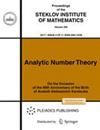由区间上的 Sinc 函数生成的广义平移算子
IF 0.4
4区 数学
Q4 MATHEMATICS
Proceedings of the Steklov Institute of Mathematics
Pub Date : 2024-02-12
DOI:10.1134/s0081543823060032
引用次数: 0
摘要
我们讨论了在空间 \(L^{q}=L^{q}((0. 1,{\upsilon})\(q\geq 1\) 上,由权重为 \(\upsilon}) 的函数体系 \(\mathfrak{S}=\{(\sin k\pi x)}/{(k\pi x)}\}_{k=1}^{\infty}) 生成的广义平移算子的性质、1),{\upsilon})/), \(q\geq 1\), on the interval \((0,1)/) with the weight \(\upsilon(x)=x^{2}/)。我们找到了这个算子的积分表示,并研究了它在(L^{q}\)、(1\leq q\leq\infty\)空间中的规范。我们将平移算子应用于研究尼克尔斯基(Nikol'skii)在系统 \(\mathfrak{S}\)中多项式的统一规范和 \(L^{q}\)规范之间的不等式。本文章由计算机程序翻译,如有差异,请以英文原文为准。
A Generalized Translation Operator Generated by the Sinc Function on an Interval
We discuss the properties of the generalized translation operator generated by the system of functions \(\mathfrak{S}=\{{(\sin k\pi x)}/{(k\pi x)}\}_{k=1}^{\infty}\) in the spaces \(L^{q}=L^{q}((0,1),{\upsilon})\), \(q\geq 1\), on the interval \((0,1)\) with the weight \(\upsilon(x)=x^{2}\). We find an integral representation of this operator and study its norm in the spaces \(L^{q}\), \(1\leq q\leq\infty\). The translation operator is applied to the study of Nikol’skii’s inequality between the uniform norm and the \(L^{q}\)-norm of polynomials in the system \(\mathfrak{S}\).
求助全文
通过发布文献求助,成功后即可免费获取论文全文。
去求助
来源期刊

Proceedings of the Steklov Institute of Mathematics
MATHEMATICS, APPLIED-MATHEMATICS
CiteScore
0.90
自引率
20.00%
发文量
24
审稿时长
4-8 weeks
期刊介绍:
Proceedings of the Steklov Institute of Mathematics is a cover-to-cover translation of the Trudy Matematicheskogo Instituta imeni V.A. Steklova of the Russian Academy of Sciences. Each issue ordinarily contains either one book-length article or a collection of articles pertaining to the same topic.
 求助内容:
求助内容: 应助结果提醒方式:
应助结果提醒方式:


